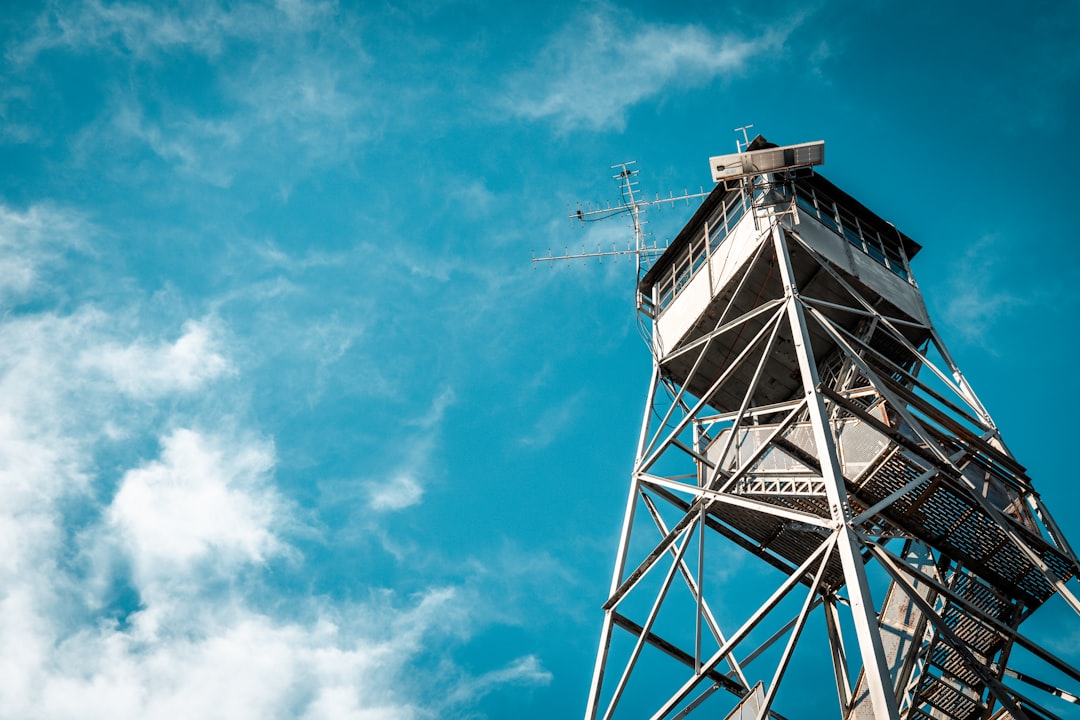
“The Fire Tower” was selected as the Season Four winner of the .
David Pearson stands before the fire tower, heart hammering, ears pounding. A cloud of cheap tequila lingers there with him.
The man knows, in his heart, he’s come here to die.
He feels for the Sharpie in his pocket, takes in a deep breath of the cool, autumn air, and begins his ascent.
The fire tower stands eighty feet tall and overlooks the Hudson River from the eastern bank. It has 109 steps in total. David knows this because it’s where he had proposed to Julia eight years ago, almost on the dot. It would have been eight years yesterday.
But all those yesterdays between then and now have left his heart empty and mind in turmoil. He and Julia couldn’t have kids. They’d tried for years to no avail. This drove him to drink—drove her away. Led him to dark places. Somewhere in that span, his father had taken his own life. In his letter he apologized profusely to his only son, insisting this was the correct course of action. Life hadn’t been the same since losing his wife to pancreatic cancer. I can’t escape this prison, James Pearson had written.
David struggled to see eye-to-eye with his father for most of his life, so it surprises him to be following in his footsteps so closely here at the end of it.
David’s knees begin to shake as he nears the first platform. When he climbs the next set of steep stairs and reaches the second, a lump forms in his throat. By the third, he feels the sting of tears. But up he goes anyway. A sense of loss, regret, and shame fills his being to the core.
By thirty-seven he’d expected to be living his best years—his best life. He had so many dreams and aspirations. Yet here he was: a sad, pathetic loner. A desperate, jobless drunk.
The viewing platform at the top of the fire tower is within sight. A final set of stairs looms ahead.
Memories run like an old film reel in his mind. They’re splotchy, segmented, black and white. Instead of reaching for Julia’s diamond ring in his pocket, David feels for the Sharpie and wonders what he’ll write on the wall of the small, plywood-covered room.
Maybe an apology: I’m sorry to whoever finds me. David Pearson, 6/1/86 - 10/16/23. Or, an even simpler note: I’m sorry for the inconvenience.
David begins to sob. His world becomes blurry as he climbs the final steps.
On the third from the top, David’s foot falls through a wide opening.
Caught off-guard, David grunts as he falls into an awkward position—one leg dangling through the gap. He tries to stand.
But as he does, something grasps his ankle. A hand?
“Whoa,” David half-shouts incredulously. Has he lost his mind?
When he tries to break free, there’s another hand—an iron grip. Some brutish, hellish force pulls him down.
David tries to twist and contort his body but it’s too late. His other leg slides through the gap. His shin violently scrapes against metal, fileting it. He flails his arms in a desperate final act to save himself as the rest of his body is pulled through. Luckily, he grasps the grooves in the step below.
There’s a sudden whirring sound. When David looks down, he doesn’t see the fire tower—doesn’t see the forest floor. He’s dangling in a vast cavern above a mountain of rubble. Stalactites surround him. Three deformed beings—perhaps men, once—cling to David’s legs from atop this bizarre mound of debris. They are naked, without most of their teeth, and their flesh has rotted to the bone in places.
“Let go!” David yells, kicking and thrashing, trying to pull himself back up through the small window to the fire tower. His arms throb.
The beings gurgle and spit in ravenous voices, clawing and tugging. If they were once able to speak, they have lost the ability.
David glances around to see if there’s an alternative, an escape route. Something flutters near his head. Then there’s a second, a third. Bats.
Off in the distance, a large fire comes to life—like a great incinerator— and there’s a smell of cooked meat.
Human flesh.
A fourth figure in tattered clothes begins to climb the mountain of rubble. Large chunks of rock and debris tumble away as he ascends to the top. When he gets there, he pries one of the others away and flings him down the mountain. The two other assailants, too far gone, pay him no heed.
The clothed individual yells as he rams into another ghoul of a man, sending him toppling head over heels. David’s apparent protector picks up a large hunk of debris and bashes the final ghoul over the head. Its grip loosens. It falls into a crumpled heap.
“David!” the man yells, looking up, wide-eyed.
David almost loses his grip: he notices his father’s voice but can hardly recognize the disfigured man. His flesh has deep burns in several places, and he is nothing more than skin and bones. Boils cover his body.
“Look at me!” he screams, parched voice cracking. Other beings—husks of the men and women they once were—climb the mountain, closing in on James Pearson.
David tries to speak, tries to say anything at all, but it’s as if ashes have clogged his airways.
“Look at me!” his father yells hysterically, over and over, as the tortured, lost souls claw and crawl their way closer to him.
Adrenaline takes over. David spares his father a final glance, then pulls himself up through the window into the other world—his world. His arms tremble and his head pounds like it’s about to split in two.
He lifts himself up through the missing step, squeezes his torso through, and finally his bloodied legs. He edges away from the gap, clumsily tumbling down two or three steps in a panic.
He breathes. Tries to process what had just taken place.
And then he stands, leans over the rail, and vomits. He tastes the tequila as it leaves his system; he hears it slap against the forest floor as it travels all seventy feet or so.
In between breaths, he begins to sob again. He forces two fingers down his throat and continues to hurl until every ounce of evil is gone. Bleary-eyed, he glances down at his legs. Sees streaks of blood and bruises forming in the shape of fingerprints.
The evil won’t be gone till I go home and shower. Hell, maybe it’ll be with me forever.
He glances toward the viewing platform, but even from here, he can see most of the valley—the Hudson River. The leaves have reached their peak. Yellow, orange, and red cover the autumnal landscape displayed before him. The sun sets over the Catskills to the west.
David walks gingerly down to the next platform. Pulls out his Sharpie and uncaps it. Writes MISSING STEP —> on the handrail in bold letters.
David inhales the cool air, spits over the edge, and finally descends all the way to the bottom of the fire tower. It’s slow going. He glances up at it before setting to the trail that would lead him through the forest and beyond.
Thank you very much for reading “The Fire Tower” today. This story is dedicated to those who struggle with mental health, addiction, or have felt the effects of suicide.
The original story idea came to me back in the spring when I brought my children on a hike at Ferncliff Forest in Rhinebeck, New York. The details in this story regarding the fire tower are true and are in fact about the fire tower at Ferncliff.
When climbing the tower with my children, I had a moment of panic. I noticed “missing step” written in Sharpie somewhere near the second or third platform. Thankfully, there was no missing step. It had been replaced.
The writer in me asked, “But what if it hadn’t?”
Take care, everyone. I hope you have a wonderful week!





A great read, the pacing was beautiful.
Reminds me of the verses in Ephesians "For we wrestle not against flesh and blood, but against principalities, against powers, against the rulers of the darkness of this world, against spiritual wickedness in high places."
Fantastic story and writing. And reminder that ghouls and ghosts aren’t limited to spooky season. They haunt us when we’re most vulnerable.